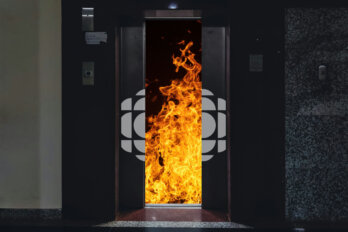The assassination of Osama bin Laden by United States Navy SEALs on May 1 was first reported on Twitter. At 9:45 p.m., White House communications director Daniel Pfeiffer alerted the media that Barack Obama would be addressing the nation at 10:30, igniting a bonfire of speculation—much of it wrong—about what he would say. The president was still working on his speech at 10:25 when former defence secretary Donald Rumsfeld’s chief of staff, Keith Urbahn, tweeted, “So I’m told by a reputable person they have killed Osama bin Laden. Hot damn.” Almost immediately, he added, “Don’t know if it’s true, but let’s pray it is.” It was 11:35 when President Obama finally informed the world that bin Laden was dead, but by then ABC, CBS, and NBC had interrupted their regular programming to tell viewers the announcement was coming.
The urge to break news is as old as journalism itself. It was at the centre of The Front Page, a 1928 play by Ben Hecht and Charles MacArthur, in which Chicago court reporter Hildy Johnson hides an escaped prisoner to prevent rival reporters from interviewing him. It was famously satirized in Evelyn Waugh’s 1938 novel, Scoop, about a hapless foreign correspondent at a sensational London newspaper called the Daily Beast (a name Tina Brown has borrowed for her breezy online news site). I myself received instruction in outwitting the competition when I worked as a summer student at the Calgary Herald. Sent one day to the home of a teenager killed in a traffic accident, I was told to ask the grieving parents for every picture of the victim in their possession so as to leave none behind for the city’s other newspaper, the Albertan.
Being first is still the name of the game, but all-news channels, smart phones, and social media have radically transformed the pace at which it’s pursued—and not always for the good. Bin Laden’s assassination was not Twitter’s first scoop, although it was certainly its biggest, and in the digital world it prompted much self-satisfied crowing about the power of citizen journalism. But was it really a scoop? For an hour and fifteen minutes, social media users were in possession of nothing more than a rumour. They didn’t actually know bin Laden was dead until the president said he was—which means they didn’t receive the news any sooner than those watching the television address. So what did they gain? It’s easier to say what they lost: an hour and fifteen minutes they might have spent more profitably contemplating something real.
The overheated race to be first encourages shortcuts that threaten the media’s credibility. In June, when a psychic tipped off police about a mass grave in Hardin, Texas, a local television station rushed the story onto its Twitter feed, where it was picked up by Reuters and eventually the New York Times. If reporters had taken the time to check the story with the police—standard procedure, until recently—they would have learned that the tip was without substance. A few days later, a hacker broke into the Conservative Party’s website and posted a report that Stephen Harper had been flown to a hospital in Toronto after choking on a mouthful of hash browns. The Prime Minister’s Office was quick to refute the story, but not before a Toronto radio station reported it as fact.
Instant news, like fast food, is often of little or no nutritional value. If you can’t be certain news is factual—if it arrives with the caveat “Don’t know if it’s true”— the calories are almost certainly empty. But why the hurry in the first place? For the media, it’s about bragging rights: you saw/heard/read it here first. But how does this haste benefit the consumer? Granted, information is power, and having it before everyone else is theoretically advantageous—assuming it’s reliable, and often not even then. Should I care, for instance, which network is first to declare a winner on election night, when my real interest is in understanding not only who won but, more importantly, why? The why of things, I’ve noticed, is rarely apparent instantaneously.
The slow food movement encourages people to eat only what’s good for them. Perhaps that’s why I’m more inclined these days to read the fine print on packaged food; I want to assess its nutritional value before I put it in my mouth. Wouldn’t this also be a sensible precaution when it comes to news? Is it time for a slow news movement? If, as physical beings, we are what we eat, as citizens we are only as sound as the news and information we consume. A diet of fast news is as unhealthy as a diet of fast food. Just as too much sugar and fat will make you sick, too much “just add water and serve” news will make you a badly informed and, therefore, impotent citizen. In the early days of computing, engineers coined a phrase that seems appropriate in this context: garbage in, garbage out.
This appeared in the September 2011 issue.




